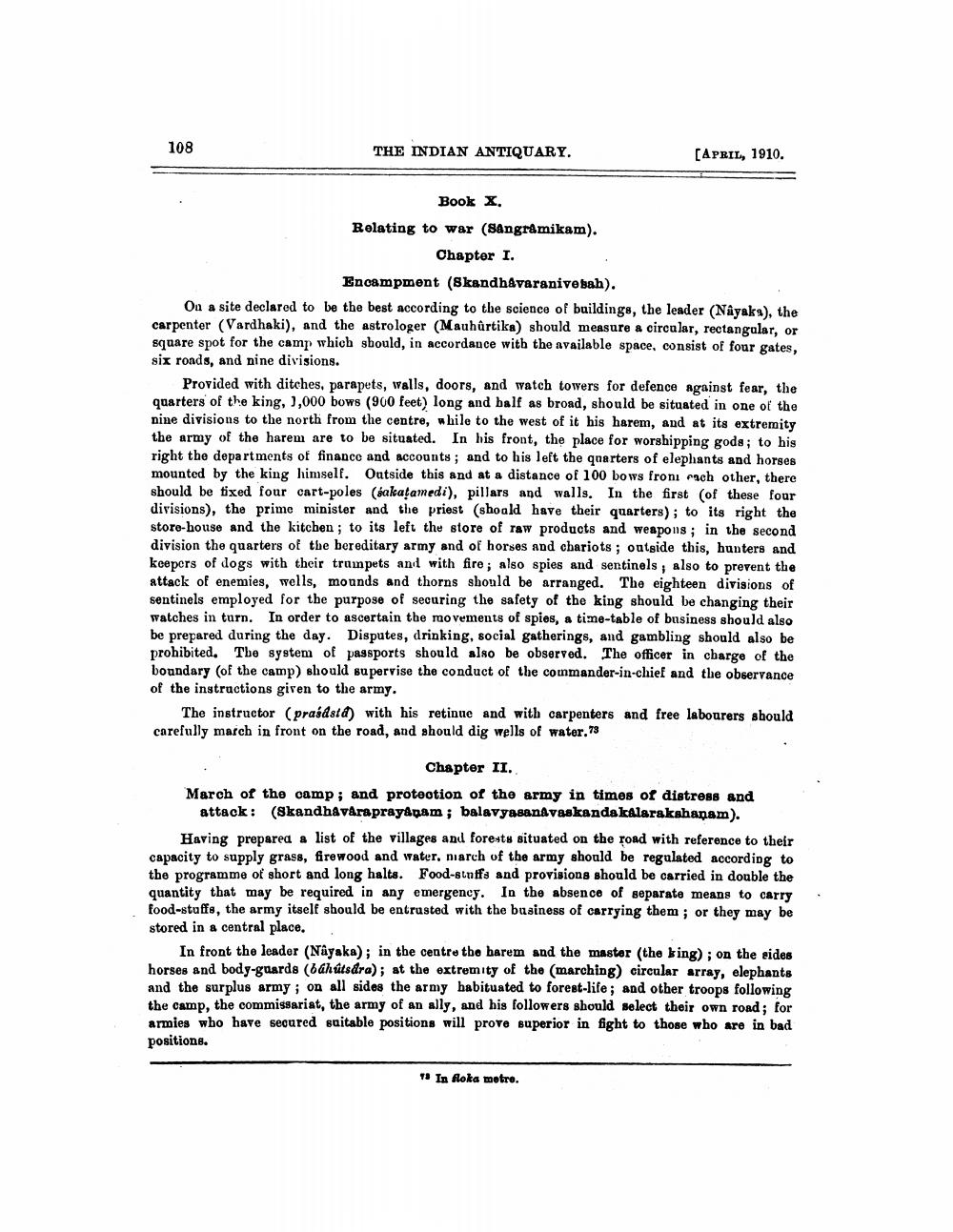________________
108
THE INDIAN ANTIQUARY.
[APRIL, 1910.
Book x Relating to war (Sangramikam).
Chapter I.
Encampment (Skandhåvaranivebah). On a site declarod to be the best according to the science of buildings, the leader (Nayaka), the carpenter (Vardhaki), and the astrologer (Mauhûrtika) should measure a circular, rectangular, or square spot for the camp which sbould, in accordance with the available space, consist of four gates, six roads, and nine divisions.
Provided with ditehes, parapets, walls, doors, and watch towers for defence against fear, the quarters of the king, 3,000 bows (900 feet) long and balf as broad, should be situated in one of the nine divisions to the north from the centre, while to the west of it his harem, and at its extremity the army of the harem are to be situated. In his front, the place for worshipping gods; to his right the departments of finance and accounts; and to his left the quarters of elephants and horses mounted by the king himself. Outside this and at a distance of 100 bows froni mach other, there should be tixed four cart-poles (sakaļamedi), pillars and walls. In the first of these four divisions), the prime minister and the priest (should have their quarters); to its right the store-house and the kitchen ; to its left the store of raw products and weapons ; in the second division the quarters of the bereditary army and of horses and chariots; outside this, hunters and keepers of dogs with their trampets and with fire; also spies and sentinels; also to prevent the attack of enemies, wells, mounds and thorns should be arranged. The eighteen divisions of sentinels employed for the purpose of securing the safety of the king should be changing their watches in turn. In order to ascertain the movements of spies, a time-table of business should also be prepared during the day. Disputes, drinking, social gatherings, and gambling should also be prohibited. The system of passports should also be observed. The officer in charge of the boundary of the camp) should supervise the conduct of the commander-in-chief and the observance of the instructions given to the army.
The instructor (praśdstd) with his retinue and with carpenters and free labourers should carefully march in front on the road, and should dig wells of water. 73
Chapter II. March of the camp; and proteotion of the army in times of distress and
attack: (Skandhavarapray&pam; balavyasanavaskanda kalarakshanam).
Having prepared a list of the villages and forests situated on the road with reference to their capacity to supply grass, firewood and water, niarch of the army should be regulated according to the programme of short and long halts. Food-sinffs and provisions should be carried in double the quantity that may be required in any emergency. In the absence of separate means to carry food-stuffs, the army itself should be entrusted with the business of carrying them; or they may be stored in a central place.
In front the leader (Nayaka); in the centre the barem and the master (the bing) ; on the sides horses and body-guards (báhútsdra); at the extremity of the (marching) circular array, elephants and the surplus army, on all sides the army habituated to forest-life; and other troops following the camp, the commissariat, the army of an ally, and his followers should select their own road; for armies who have secured suitable positions will prove superior in fight to those who are in bad positions.
1 In floka motre.




